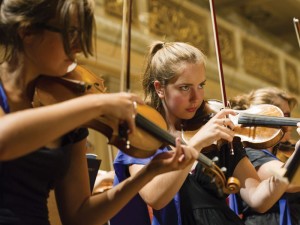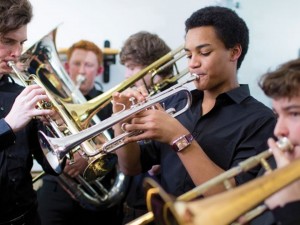Fiddlin’ Around – January, 2016
 By Nancy Buchan
By Nancy Buchan
During the first week of December the fine folks who run the Escuela de Musica Sinfonica de Perez Zeledon, a private music school in San Isidro, schedule the end of the year examinations for all the students who study and receive music instruction there. There’s all ages enrolled in the school, and this past year my dozen students ran the gamut from 7 year olds playing little bitty violins to teen-agers with tuner and metronome apps on their cell phones. They get nervous over the testing, not realizing that I am not judging them for their performance that day (unless they are arrogantly un-prepared and insolent about it—which has never happened to me here in Costa Rica), but that my grades are based on their overall abilities and progress. I wonder if they are enjoying themselves and try to evaluate if they have consistently gotten better. Do they appear to enjoy the process? Is this the right instrument for them? For the struggling student should I abandon the rigid classical approach for a friendlier, learn by ear method? Are they capable of the repetitive practice and focus necessary to learn the skills they need? And then it’s back to the most important question—are they having fun?
I teamed up with another of the violin professors for our day of tests, a handsome, young, hard-working and talented violinist from El Salvador who is going to the university in San Jose, playing in several different orchestras and ensembles, taking teaching jobs when he can and who is passionately pursuing a career in music. We have both taught this one boy, and we were discussing why the kid doesn’t seem to be getting any better or more enthusiastic about his violin studies. My teaching partner ventured the opinion that the boy thought that somehow playing the violin was for sissies. He probably doesn’t realize that the most renowned and highest paid violinists have traditionally been men, and that orchestra members and conductors are overwhelmingly male. I started digging up some facts, and was kind of appalled at how gender bias rears its’ ugly head so early. I’m not going to indulge myself in ranting and raving about the injustice of it all—I am over worrying about that kind of crap—but I do find it odd and dismaying that the natural attraction to a particular instrument gets shoved to the side because of societal or traditional stereotypes. I also realized that out of 40 or so violin students at the school, only 6 are boys.
My Father grew up in an orphanage run by well-meaning Masons, and he showed musical talent early, so the women’s Masonic organization bought him a violin and lessons. He told me how he used to regularly hide his violin in some bushes while walking to public school, because he would get beat up on for his lack of societal status (kids can be cruel) and for his musical specialness. He also was a wrestler, ran track, played football and eventually joined the horse cavalry. In later years those same narrow-minded jerks who called him a sissy envied him his local fame as a bandleader, radio personality and respected musician. As he got older his background meant less than the doors that were opened for him as a musician. Kinda like the skinny electric guitarist who gets all the girls…..
 Here’s a study I found interesting. A bunch of 3rd graders listened to all the basic instruments used in an orchestra and were asked which ‘sound’—which ‘timbre’—they preferred. The boys liked the sound of the oboe, English horn, bassoon, tuba and flute, in that order. Their least preferred instrument sound was the trumpet and trombone. Girls liked the flute, and double reed instruments like the clarinet, oboe and saxophone. The next year, when the kids picked the instruments they were to play, 83% of the boys chose to play the sax, trumpet or trombone, even though only 28% had shown a preference for those instruments. 80% of the girls chose to play flute or clarinet, yet only 40% preferred that sound. The conclusion was that despite which sound the kids liked the best, they chose gender stereotypes instead. Maybe their parents or siblings or friends or peers pushed them into it, but it seems simple to me—we should follow our hearts. In all things. Always.
Here’s a study I found interesting. A bunch of 3rd graders listened to all the basic instruments used in an orchestra and were asked which ‘sound’—which ‘timbre’—they preferred. The boys liked the sound of the oboe, English horn, bassoon, tuba and flute, in that order. Their least preferred instrument sound was the trumpet and trombone. Girls liked the flute, and double reed instruments like the clarinet, oboe and saxophone. The next year, when the kids picked the instruments they were to play, 83% of the boys chose to play the sax, trumpet or trombone, even though only 28% had shown a preference for those instruments. 80% of the girls chose to play flute or clarinet, yet only 40% preferred that sound. The conclusion was that despite which sound the kids liked the best, they chose gender stereotypes instead. Maybe their parents or siblings or friends or peers pushed them into it, but it seems simple to me—we should follow our hearts. In all things. Always.
Instruments themselves don’t favor or require males or females to play them. Except for the possible strength needed to carry around a harp or a tuba or an upright bass, instruments are not concerned with gender. A large group of male college students were asked which instruments are more masculine, and they named drums, trombone, trumpet, sax, cello, clarinet, violin and flute—in that order—from the largest and loudest to the softest and smallest. They were also asked what the most feminine instrument is, and they overwhelmingly said the harp. Which is a big ‘ole thing to carry around but which produces a soft and beautiful sound. I’m not sure what all that means, because instruments have come and gone in popularity and use, and maybe it’s just typical evolutionary stuff. You don’t see harpsichords or bass flutes or balalaikas or dulcimers much anymore—it’s the guitar age now! An instrument that goes equally well with black leather pants on a long haired guy or a sweet girl in jeans and a t-shirt.
Surveys of the worlds’ symphony orchestras show a huge gender imbalance. The Vienna Philharmonic is well-known for its’ archaic attitude to women, with 70% of their members being male. There are around 800 orchestras in the U.S, 80% of which have males on the podium guiding them. In the highest budgeted major orchestras 21 out of 22 of the conductors are male. Most orchestras in America are up to about 40% female members, but not because they voluntarily made efforts at female inclusion. An African-American musician sued the Musicians Union and Symphony board for discrimination back in the 70s, and ever since then at least the first rounds of auditions for most organizations are held ‘blind’. The instrumentalists play behind a curtain to a group of symphony big shots who cannot see whether they are male or female, or what race they might be. They even have a plush carpet for them to walk in on so no one can hear the clack of high heels. This has done more to even out the playing field than good intentions ever inspired. Fear of litigation is quite a motivator. Just like in the popular TV show called The Voice, where the judges backs are turned to the aspiring singer, and they can hear him/her and hear the audiences reaction, but they can’t see them. In the image obsessed pop music world we all have to admit that looks matter, but it sure shouldn’t matter to the oboe section.
Research on school kids in Australia has shown that children as young as 5 exhibit stereotypical preferences when it comes to musical instruments, and that these preferences are considerably more fixed among boys than girls. That study concluded that girls become more flexible as they get older, and that making gender based choices can restrict what children, all people, do in life.
They said:
These kinds of choices can affect what you learn and what you do later in life, and they affect all kinds of leisure activities, the sports people play and career choices. Even at 5 children believe doctors are male and nurses are female—when it comes to music a little boy may be the next Yo Yo Ma, but is not encouraged to play the cello. So he picks up the drums, is terrible and winds up not playing anything.
There are tons of studies made about how students choose their instruments, and after pouring over a bunch of the data, I can only make a few conclusions. One is that we do a disservice to kids by re-enforcing the gender roles instead of opening up their minds and encouraging them to pick an instrument because the sound appeals to them. After a lifetime of being a professional musician I have had to confront gender discrimination many times, even in the supposedly freer realm of rock and jazz music. Whether this is because of historical precedent or genuine differences in how males and females approach learning music, I don’t know. But I do know we should allow the kids to make their choices without stupid interference by folks who believe that girls can’t be drummers and boys shouldn’t play the flute. I wish everyone a Happy New Year—probably too much to hope for to wish for Peace on Earth, but maybe we can wish for peace in our hearts and in the hearts of the youngsters who will inherit this world from us.
There are a bunch of quality musicians around here, both male and female, who perform locally, so check the listings in this magazine and make the effort to get out and support live music and the venues that hire them!
The question isn’t who’s going to let me; it’s who’s going to stop me. Ayn Rand
The first problem for all of us, men and women, is not to learn, but to unlearn. Gloria Steinem
I have one message for young musicians around the world: Stay true to your heart, believe in yourself and work hard. Joe Cocker
Some women choose to follow men, and some women choose to follow their dreams. If you are wondering which way to go, remember that your career will never wake up and tell you that it doesn’t love you anymore. Lady Gaga
